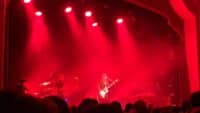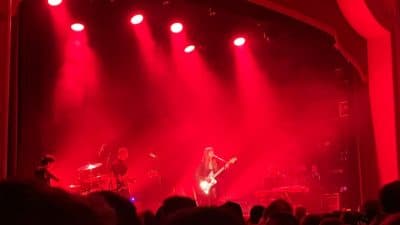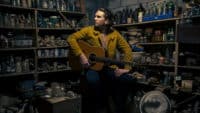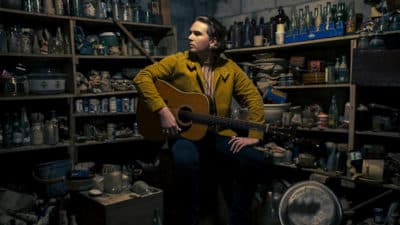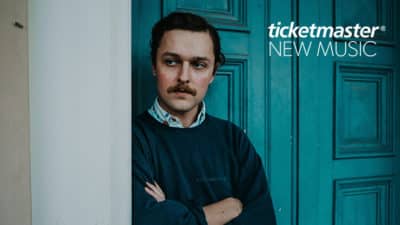Interview
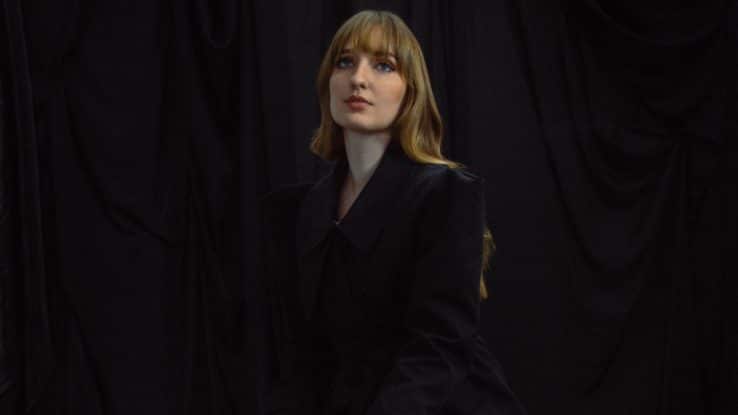
Interview
Madison Cunningham: “To open up without soul is the most dangerous thing”
The US singer-songwriter talks life on the road, opening for Harry Styles, and her Grammy-nominated second album
Critics, fans and YouTube comments all agree: Madison Cunningham may just be one of our next great songwriters. The Californian artist has carved out her own distinctive sound – a blend of folk-pop, soft rock and Americana sustained by haunting, piercing vocals – but it’s her writing that has sparked comparisons to some of the greatest artists of the last few decades.
This year’s Grammy nominations have seen her once again nominated for Best Folk Album with Revealer, her complex and vulnerable second album. “It’s very unexpected,” she tells us as we sit backstage at Islington Assembly Hall, where Cunningham is preparing to play that evening. “Even for a second time, you never expect it’ll come back your way.”
Tonight’s show will be one of the biggest headline gigs of Cunningham’s career so far. After this, she heads to Oslo, and then plays a string of dates across Europe. “Paris is always kind of a highlight because it’s great food and it’s just beautiful,” she says. “And I’ve never seen it in the winter, so I’m pretty excited about that.” If she feels the pressure of tonight’s show – or of the growing anticipation surrounding her next move – it doesn’t show. At just twenty-six, there are likely to be many more big shows and awards nominations in Cunningham’s career. For now, she’s enjoying the journey.
Revealer, as the name suggests, is a very intimate and personal album. Do you find it easy to open up to your audience in that way?
I think it’s hard to do. Or it’s hard to do well, and that’s the part that’s the scariest maybe – to be vulnerable, and feel like you lack eloquence, or elegance, or whatever. But to be open with people is a relief, because you feel it’s like a bridge of connection and a way to sort of understand other people and for them to understand you. That part isn’t hard. It’s just the execution that can be hard.
In what way?
In wanting to make sure that you hit all the marks. In music, you’re trying to say something that’s musically compelling, but the sentiment has to be as compelling as well. And it’s really easy to, I don’t know, to rhyme or to do whatever without soul or without feeling. To open up without soul – that’s the most dangerous thing, I think.
Just for the sake of putting words down, you mean?
Exactly. It’s really easy to love a song or an idea or a rhythm and just put lyrics over it for the sake of just getting the song down. And I think what I really wanted to avoid in making this record was that sort of cruise control feeling. I wanted it to be very multi-dimensional. And that took a long time to find that in myself and to believe in what I was saying.
Would you say you’re a bit of a perfectionist?
Yes, I am a perfectionist. I don’t agree with that mindset. But that is who I am. It took probably two years to write and then to record the album in total.
Where did Revealer start for you?
At the end of 2019, I knew that I needed to start thinking about writing songs for another record. And 2020 was set to be a year where I was just going to be at home writing. So I started writing a song called ‘All I’ve Ever Known’ at the very, very beginning of 2020. That was the song that kicked off the others.
As someone who also grew up in a Christian household, I found ‘All I’ve Ever Known’ to be a really interesting listen. Where did that song come from?
I was traveling a lot, and I’d been on the road a lot and just had met so many different people with so many different experiences and opinions. I think that just started to challenge the belief system that I was willing to call my own without putting real critical thinking into it. Writing that song was me just sort of airing out all of those larger questions that I felt like I did a very good job at avoiding in my life, and I still have a tendency to do that. I felt like I knew what I was trying to try to say.
It’s very much speaking about how you’re afraid to think a different way because you get accustomed to the way that you’ve always done things and it’s so much less convenient to dig it all up again. To start over and see what becomes of that and what grows out of that. But I think it’s so important for human evolution to open up your mind to other people’s lives and experiences. It doesn’t mean that you ditch the other stuff entirely. It just means that it’s getting reshaped.
Do you ever get nervous for the people close to you in your life to hear these thoughts when a song gets released?
Yeah, because I’m not a verbal processor. I do think that sometimes the thoughts that come to pass inside of a song hadn’t yet made their way out of out of my mouth, like in conversation with people. So I think sometimes, songs can be the unveiling of what you would actually like to say, I have a hard time composing some of those things into words. So yeah, I do I get nervous. I use real life examples from people I’m close to in my songs, and that can be nerve wracking.
You write about your grandmother in ‘Life According To Rachael’, which has also been nominated for a Grammy. What does that song mean to you?
I think the writing of that song was a way to process the guilt that I felt when she passed. There’s sadness in there, and sorrow and all those things, but I just think it’s all through the lens of a little bit of guilt. Like, once someone passes forever, it’s this very permanent open ended reality where you have so much time to think about all the things that you could have done. I just kept thinking about all the times that she texted me and I didn’t reply. I still have one on my phone where she had texted me something and I was just like, “Oh, I’ll text her back later.” And she passed a couple of days later. I think it was me also just processing life’s fragility and what we as humans do with that, and how to be as productive as we can and as purposeful as we can with the time that we have. It’s me just saying some things to her that I wish I could have.
It must have been amazing to see other people’s responses to that song. It feels as if that’s the track on the album that people have really connected with the most.
I agree. And I think it’s because while the song is very specific, and it’s about her life, there’s still a general element to what that song means for other people. I didn’t expect this necessarily, but it’s been really cool to hear the way they colour in those lyrics for themselves and the way it reflects their own grief back to them. And it’s taught me a lot about the levels to which grief can go. Losing a grandparent is a very specific kind of grief, but it’s a loved one, you know, she was the first loved one I’d ever really lost.
Is it something you think about when you’re writing a very personal song like that – the way it’s going to be received when it’s out in the world?
It’s always a balance of both. In writing that song I remember actually being a little bit more specific with the lyrics and I ended up shaving some of those off and being like, “I feel the burden of making this a song that leaves room for other people to exist in.” I’m specific about trying to not think about what other people are gonna think about the song until I have to – keeping the editor’s hat and writer’s hat separate, you know. And then finally when the editor’s hat comes on, I think, “Is this general enough for people to put on for themselves?”
Your NPR Tiny Desk performance is up on YouTube, and the comments are flooded with comparisons to artists Joni Mitchell and Jeff Buckley, and these other artists who have been hailed for writing immortal songs that resonate throughout the decades. Do those comparisons ever feel overwhelming?
Yeah. Yeah, they do. Because there’s always the fear of not wanting to be derivative of something that somebody else has already done. And also just… those are towering figures. It’s funny, though – it’s like it’s not paralysing to me unless I let myself believe it, and I don’t believe it. I don’t see myself in line with Joni or Jeff. I just know that they have something that I aspire to have, but I don’t see myself as being that, if that makes sense. So in that way I’m not paralysed. I’m just trying to be that.
Who are your main influences?
I mean, yeah, Joni and Jeff Buckley and Fiona Apple, Rufus Wainwright, an artist named Juana Molina – a great guitar player, songwriter, vocalist. The list goes on and on. I love Grizzly Bear, I love Radiohead, John Bryan, Elliott Smith – these are all huge lynchpins for me.
You’ve talked about how you wanted your guitar playing to feature more on Revealer than it has on past projects. Were you a singer or were you a guitar player first?
Kind of both. I think I considered myself to be a singer first, before a guitar player, and then that kind of levelled out. And sometimes it switches, depending on the context. But I see myself as both.
Where did you start with music?
I started playing guitar when I was about seven and I started writing songs around then. It all made sense together. Guitar has always been a vehicle for the songs and the songs have always been a vehicle the vocals and for a love of life.
Was it always what you wanted to do, or did you ever consider a different path?
No, I didn’t. I didn’t really think that another road was an option. It just felt like music is what I could excel at because I knew I loved it, and I really enjoyed all elements of the process. So I just stuck with it and didn’t have a plan B. But I’m always trying to find hobbies and things to take me out of music, because it can be a little much.
Does it make it difficult to find a work life balance when you feel so passionately about it?
Yeah, for sure. I mean, there’s always something to get better at. There’s always something to do. There’s always a song to write. I think it’s really hard to shut it off. Especially if your purpose is so entangled with it. Which I really tried to not let happen because it’s so hard to do. It’s a very purposeful thing. It gives me life and I love it. But I really try to spend time separate from it to understand who I am without it.
You opened for Harry Styles a couple years ago after he appeared in your Instagram DMs. Did you believe the message when you saw it?
No, I was a little hesitant. It had the blue checkmark, but I just thought “There’s no way that he’s reached out…” I just felt like our worlds would never collide. Well, yeah, it turned out to be him. And it turned out that by the time he had sent me the message, he had already reached out to my booking agents and so it was totally legit. My sisters thought I was so cool.
You’ve had so many big moments so far – four Grammy nominations, these huge shows… Is there a moment that you’re proudest of so far in your career?
Actually, this show tonight in London is one of the biggest headline shows that I’ve ever done. That’s feels like a milestone. For it to be outside of my own country is just kind of mind blowing. And so this is a moment I’m really proud of.
What’s on the cards for you in 2023?
I’m working on a new record, slowly. I usually start sonically with what I would hope that it would be and then everything else is kind of a realisation after the fact. But I’m still very much in the nervous phase where you’re afraid that you’ve forgotten how to write again and you need to acclimate to being off the road. I still have a long way to go.




